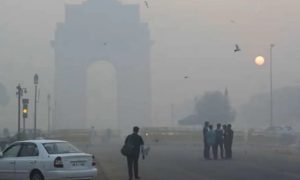Pointing out that based on “current scientific evidence”, the Omicron variant is at least three times more transmissible than the Delta variant, the Centre has said that decision-making at the district level “must be very prompt and focussed.
Warning that the Omicron variant of Covid-19 is “at least three times more transmissible” than the Delta variant, the Centre on Tuesday directed states to impose strict restrictions in districts reporting high positivity rate, including imposition of night curfew, strict regulation of large gatherings and containment measures.
The Centre also told the states to “activate” war rooms and keep analysing trends and surges, directing that specific measures need to be taken in view of “initial signs of a surge in cases of Covid-19 as well as increased detection of the variant of concern (VOC), Omicron, in different parts of the country”.
The direction by Union Health Secretary Rajesh Bhushan came on a day when India’s cumulative tally of Omicron cases touched the 200 mark. According to official data, seven states in the country are now reporting Omicron cases in double digits — Maharashtra (54), Delhi (54), Telangana (20), Karnataka (19), Rajasthan (18), Kerala (15) and Gujarat (14).
“At the district level, there should be a constant review of emerging data regarding the population affected by Covid-19, geographical spread, hospital infrastructure and its utilisation, manpower, notifying containment zones, enforcement of perimeter of containment zones. This evidence should be the basis for effective decision making at the district level itself. Such a strategy ensures that infection is contained at the local level itself before it spreads to other parts of the state,” Bhushan wrote.
The Centre has advised district-level containment measures and restrictions if a district reports positivity of 10% or more in the last one week, or bed occupancy of 40% or more on oxygen-supported or ICU beds. However, “based on the local situation” and “population characteristics such as density, and keeping in mind the higher transmissibility of Omicron”, states can enforce restrictions even before they report these numbers.
The containment measures listed include “imposition of night curfew, strict regulation of large gatherings, curtailing numbers in marriages and funerals, restricting numbers in offices, industries and public transport”. “ln case of all new clusters of Covid positive cases, prompt notification of containment zones, buffer zones should be done, strict perimeter control of containment zone as per extant guidelines must be ensured. All cluster samples must be sent to INSACOG labs for genome sequencing without delay,” Bhushan wrote.
Pointing out that based on “current scientific evidence”, the Omicron variant is at least three times more transmissible than the Delta variant, the Centre has said that decision-making at the district level “must be very prompt and focussed”. “Besides, the Delta VOC is still present in different parts of the country. Hence, even greater foresight, data analysis, dynamic decision-making, and strict and prompt containment action is required at the local and district level,” it said.
On testing and surveillance, districts have been told to conduct door-to-door case search, test all Severe Acute Respiratory Infections/ influenza-like-illness and vulnerable/ co-morbid people, ensure right proportion of RT-PCR tests in total tests being conducted daily, and contact tracing of all Covid-positive persons.
The Health Ministry has also urged states to ensure strict enforcement of home isolation. “This will be a very critical activity in the days to come, specially to ensure that persons under home isolation do not spread the virus to others in view of its higher transmissibility,” Bhushan wrote.
The states have also been asked to ensure 100% vaccination coverage. “Special focus to be given to those districts where the first and second dose coverage is less than the national average. The door-to-door vaccination campaign needs to be strengthened,” the Health Ministry said.



































